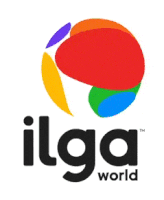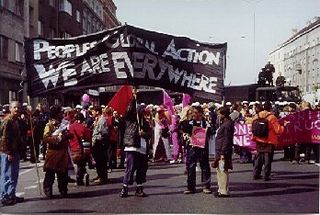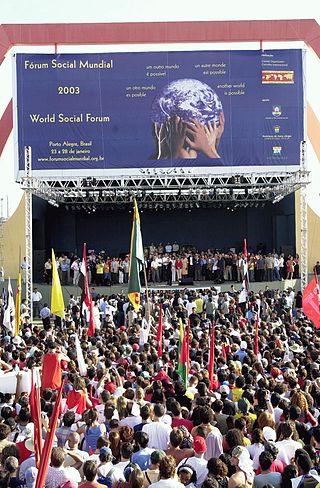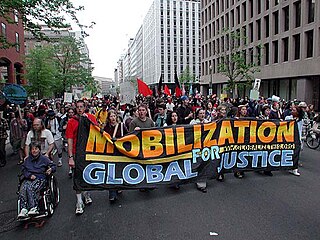
The environmental movement is a social movement that aims to protect the natural world from harmful environmental practices in order to create sustainable living. Environmentalists advocate the just and sustainable management of resources and stewardship of the environment through changes in public policy and individual behavior. In its recognition of humanity as a participant in ecosystems, the movement is centered on ecology, health, as well as human rights.

The International Lesbian, Gay, Bisexual, Trans and Intersex Association (ILGA) is a LGBTQ+ rights organization.

Peoples' Global Action (PGA) was the name of a worldwide co-ordination of radical social movements, grassroots campaigns and direct actions in resistance to capitalism and for social and environmental justice. PGA was part of the anti-globalization movement.
The European Social Forum (ESF) was a recurring conference held by members of the alter-globalization movement. In the first few years after it started in 2002 the conference was held every year, but later it became biannual due to difficulties with finding host countries. The conference was last held in 2010. It aims to allow social movements, trade unions, NGOs, refugees, peace and anti-imperial groups, anti-racist movements, environmental movements, networks of the excluded and community campaigns from Europe and the world to come together and discuss themes linked to major European and global issues, in order to coordinate campaigns, share ideas and refine organizing strategies. It emerged from the World Social Forum and follows its Charter of Principles.
The Cairo Conference against U.S. hegemony and war on Iraq and in solidarity with Palestine, generally known simply as Cairo Anti-war Conference, is an anti-war and anti-neo-liberalism conference held regularly since 2002 in Cairo, Egypt. The Cairo Conference set up the International Campaign Against Aggression on Iraq which helped to coordinate the worldwide demonstrations on 15 February 2003. In 2009, the Conference was banned by the government of former Egyptian President Hosni Mubarak.
The 2001 World Conference against Racism (WCAR), also known as Durban I, was held at the Durban International Convention Centre in Durban, South Africa, under UN auspices, from 31 August to 8 September 2001.

The Global Call to Action Against Poverty (GCAP) is a network of over 11,000 civil society organizations (CSOs) dedicated to social justice, established in 2005 during the World Social Forum in Porto Allegre. It represents approximately 58 national groups. It serves as a platform for individuals and organizations to unite against systemic factors perpetuating poverty and inequalities.
TransAfrica is an advocacy organization in Washington, D.C. that seeks to influence the foreign policy of the United States concerning African and Caribbean countries and all African diaspora groups. It is a research, education, and advocacy center for activism related to social, economic and political conditions in Africa, the Caribbean, and Latin America and other parts of the African Diaspora. TransAfrica is the largest and oldest social justice organization in the U.S that focuses on the African world. It has served as a major research, educational, and organizing institution for the African and African descendant communities and for the U.S. public in general.

Gail Omvedt was an American-born Indian sociologist and human rights activist. She was a prolific writer and published numerous books on the anti-caste movement, Dalit politics, and women's struggles in India. Omvedt was involved in Dalit and anti-caste movements, environmental, farmers' and women's movements, especially with rural women.

Rasool Bux Palijo was a Pakistani leftist, Marxist leader, scholar and write. He was a leading human-rights lawyer and the leader and founder of Awami Tahreek, a progressive and leftist party.

Total liberation, also referred to as total liberation ecology or veganarchism, is a political philosophy and movement that combines anarchism with a commitment to animal and earth liberation. Whilst more traditional approaches to anarchism have often focused primarily on opposing the state and capitalism, total liberation is additionally concerned with opposing all additional forms of human oppression as well as the oppression of other animals and ecosystems. Proponents of total liberation typically espouse a holistic and intersectional approach aimed at using direct action to dismantle all forms of domination and hierarchy, common examples of which include the state, capitalism, patriarchy, racism, heterosexism, cissexism, disablism, ageism, speciesism, and ecological domination.

Salil Shetty is an Indian human rights activist who was the Secretary General of the human rights organization Amnesty International (2010–2018) till 31 July 2018. Previously, he was the director of the United Nations Millennium Campaign. Before joining the UN, he served as the Chief Executive of ActionAid. Most recently, Shetty had a short stint as the Vice President of Global Programs at the Open Society Foundations.

Zulfiqar Shah is a civil rights activist, journalist and writer of Sindhi origin. He was forced by the Pakistan Army to unlawfully leave the country and close down The Institute for Social Movements, Pakistan in May 2012. He resettled in Nepal, where the UNHCR approved him for refugee status. In Kathmandu, he began freelancing with newspapers and websites on the issues of Pakistan, particularly concerning Sindh and the restive province of Balochistan. He was insurrected in his house in Kathmandu and was given heavy metal poison by the Pakistani intelligence agency ISI with local facilitation; however he was rescued by local doctors. He was forced to leave Nepal, thus he left for Pakistan in December 2013. In Pakistan, he again was persecuted and threatened to be killed. He went India for medical treatment on 11 February 2013, where he was not only denied appropriate health treatment at the behest of the Pakistan High Commission in New Delhi, but was also harassed by high commission officials. He, along his wife Fatima Shah, gave a protest sit-in for 285 days near the Parliament of the Republic of India in defiance of the threats against his life committed by the Pakistan High Commission and its facilitation by the Indian authorities.

The Institute for Social Movements, Pakistan (ISM) was first of its kind of institution in Sindh, Pakistan that clubbed together social movements studies, activism and research. Established by prominent activists, journalists, development professionals and academics from across Sindh, ISM was primarily active in almost all districts of Sindh and Sindh bordering districts of Balochistan. The Institute was established in Hyderabad in March 2010 after several deliberations held in Karachi, Hyderabad, Umerkot and Sukkur; however due to its important role in supporting civil, political, minorities and land rights in Sindh and Balochistan, ISM was involuntarily closed down on the pressure and threats by Pakistan Army associated intelligence agencies ISI and Military Intelligence on May 29, 2012. The founding directors of the ISM Zulfiqar Shah and his wife Fatima Shah were persecuted, harassed and threatened to death, and were asked to leave Pakistan, who left the country on May 30, 2012 and sought asylum with UNHCR in Nepal, which was granted to them.

The World Social Forum is an annual meeting of civil society organizations, first held in Brazil, which offers a self-conscious effort to develop an alternative future through the championing of counter-hegemonic globalization.

Alter-globalization is a social movement whose proponents support global cooperation and interaction, but oppose what they describe as the negative effects of economic globalization, considering it to often work to the detriment of, or to not adequately promote, human values such as environmental and climate protection, economic justice, labor protection, protection of indigenous cultures, peace and civil liberties. The movement is related to the global justice movement.

The anti-globalization movement, or counter-globalization movement, is a social movement critical of economic globalization. The movement is also commonly referred to as the global justice movement, alter-globalization movement, anti-globalist movement, anti-corporate globalization movement, or movement against neoliberal globalization. There are many definitions of anti-globalization.

The global justice movement is a network of globalized social movements demanding global justice by opposing what is often known as the “corporate globalization” and promoting equal distribution of economic resources.

Dalit feminism is a feminist perspective that includes questioning caste and gender roles among the Dalit population and within feminism and the larger women's movement. Dalit women primarily live in South Asia, mainly in Bangladesh, India, Nepal and Pakistan. Dalit women face different challenges than women in oppressor castes in these countries. They are more likely to be poor, uneducated and socially marginalized. Dalit feminists advocate and have advocated for equal rights for Dalit women based on gender, caste and other issues. They have addressed conferences, created organizations and helped elect other Dalit women into political office.

The Non-Aligned Movement (NAM) is a forum of 120 countries that are not formally aligned with or against any major power bloc. It was founded with the view to advancing interests of developing countries in the context of Cold War confrontation. After the United Nations, it is the largest grouping of states worldwide.
















